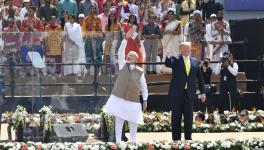Indian Democracy and the Pegasus Blues

Some of us may still remember the melody, “Let’s start at the very beginning”. In the hugely successful musical The Sound of Music (1965), this melody formed the opening to the song Do Re Mi, which was used to teach the seven von Trapp siblings the basics of music. The Pegasus spy scandal, which may rock Indian democracy, also requires us to return to the basics and confront four fundamental truths.
One, whatever little we have learned so far about the eerie possibilities that the Pegasus spyware contains, in all likelihood, the government of India has used it to spy on select Indian nationals, which seems to have the potential to jolt the Narendra Modi government. The more the latter dodges the question by resorting to vague and general responses, the greater the risk it runs of facing larger embarrassment once it is forced to debate the matter.
Two, if the Pegasus spyware is just an advanced technology and nothing more, then it is unthinkable that only one private company in Israel can possess it. That similar companies, say American or Chinese, do not yet possess it is inconceivable.
Three, how can one so completely trust a company’s claims that it sells its wares only to government agencies? In the first place, no company ever shares its trade secrets so openly; and two, in today’s world, where transnational capital mocks the very notion of state sovereignty, such a pledge cannot but be fictional.
Four, even if one concedes that the state has the authority to intrude into a citizen’s private life, provided such intrusion is duly approved by law, does that law also allow snooping through a foreign outfit when questions of national security are involved? Today it is Congress leader Rahul Gandhi; tomorrow, it may well be Prime Minister Narendra Modi. After all, the present India-Israel bonhomie is not etched in stone.
It is elementary that international relationships change like monsoon clouds. The questions that the Pegasus spyware scandal raises, therefore, go far beyond India’s party politics. They may engulf even the present international order, which may in due course need to go for an international covenant to restrain this hydra-headed monster. It is not just for nothing that France and Israel have ordered high-level enquires into the matter. The spyware may do havoc with the international financial system.
State-sponsored spying is an old institution. We have grown up hearing stories about how kings in olden times would disguise themselves as commoners and eavesdrop on their subjects to keep themselves abreast of the popular mood. As we became older, we reconciled ourselves to the sophistication of statecraft, which inevitably included espionage as a legitimate state activity. Our own pride, Kautilya, advised the king to spy on his finance minister lest he defalcates state funds. As a paid functionary handling public funds, the finance minister had both the means and the potential motive to indulge in embezzlement.
So, if spying is a routine state activity, why the fuss about Pegasus, one may innocently ask. Predictably, this innocence leads to the usual whataboutery. Apologists for the BJP government obliquely argue that Indira Gandhi too spied on her political rivals; some go so far as to point out that even her young daughter-in-law, Maneka Gandhi, was not spared. Didn’t Rajiv Gandhi spy on the then President of India, Giani Zail Singh, they add.
But there is a problem here. Cannot the logic be turned on its face? We still have not condoned either Indira Gandhi or Rajiv Gandhi for whatever mischief they did. To do otherwise would be akin to saying that since witch-hunting and bride burning happened in the past, we should permit them today. Heads I win, and tails you lose is not a respectable proposition.
In the present context, old comparisons further do not make sense for two specific reasons. One, technology has changed dramatically over the past four decades. And two, there is a difference between choosing a potential political opponent and targeting an ordinary individual simply to collect kompromat (compromising material) for possible use in the future.
Why, after all, were family members of the court employee who made sexual abuse allegations against a former Chief Justice of India on the Pegasus list? Suppose the rumour now making the rounds even partially holds water. In that case, the obvious conclusion is that the user of the Pegasus spyware was trying to blackmail the Chief Justice to make him pass verdicts in the Supreme Court that were favourable to the government.
The problem is that over the centuries, we have gotten so comfortable condoning palace intrigues that we habitually pardon the state, even if it curtails our freedoms and intrudes into our lives. We routinely give the state the benefit of the doubt because of our ingrained commitment to national security. Rarely do we acknowledge that national security has increasingly been reduced to a mere euphemism for power aggrandizement.
It leads to a dangerous tendency of accepting encroachments into democratic rights as the ‘new normal’. The spectre of ‘official secrets’ is so overhyped these days that even retired officers sweat over the publication of their memoirs, paranoid that they may have inadvertently compromised the national interest. No longer is their judgment trusted; instead, the proposed rules are plainly meant to humiliate and silence them.
The system of facial recognition may soon get introduced. If it is limited to crime detection, it is well and good. But the fear is that it may soon be clandestinely used to spot who participated in which political rally to harass them selectively. Mercifully, the European Union and some states in the United States have decided to go slow on the matter, which might influence others to relent, or at least reassess such technologies.
One last point. The Pegasus controversy is just one among many symptoms of a much deeper malaise afflicting contemporary India. Basking in the false glory of “mera desh mahaan” (my country is great) and Vishwaguru (world leader) status, India is increasingly becoming a laughingstock on the world stage.
Here are some facts, which point to a deeper malaise. A country of almost 1.4 billion people is represented by just 543 Members of Parliament (MPs). On average, each MP represents 2,578,269 Indians. To put these numbers in perspective, consider that the 650 Members in the United Kingdom’s House of Commons represent a mere 66 million people. In other words, each United Kingdom MP represents just 1,01,538 people; that is, 25 times less than his or her Indian counterpart.
The other side of the story is even more agonizing. The president of PRS (Policy Research Studies) Legislative Research, MR Madhavan, has compiled some startling statistics. Four consecutive sessions of the Indian parliament have ended prematurely, including the cancelled winter session of 2020. These sessions were also routinely disrupted. The Lok Sabha functioned for just 19% of its originally scheduled time, and the Rajya Sabha for only 26%.
And yet, the government bulldozed 18 bills into law. Only one of these bills had the luxury of more than 15 minutes of discussion. Almost all the remaining bills were passed as soon as they got tabled. In the Fifteenth Lok Sabha (2009-14), 18% of the Bills were passed within the same session. This rate rose to 33% during the Sixteenth Lok Sabha (2014-19). We are less than halfway through the Seventeenth Lok Sabha (2019-24), but that rate has already touched a scarcely believable 70%. Against this background, if we expect this government to allow an open-ended discussion on Pegasus, we are living in a fool’s paradise.
Let me conclude by recalling the by-now famous formulation that the solution to democracy’s problems is more democracy. One may suspect that this is an invitation to anarchy. But the American playwright Edward Albee must have been philosophical when he said that “an anarchist is the only person who takes democracy seriously”. His underlying belief must have been that the path to democracy has to be noisy and chaotic. There is no easy way.
What we must, however, note is that not everything is an election. Conversely, an election is not everything. Just like a thermometer can only tell us about the presence of fever and not its cause, an election can only tell us who will rule, not the direction in which the country is headed. It is important, therefore, to educate voters about the larger questions at stake, such as the importance of liberty, secularism and, indeed, individual privacy.
Let us constantly alert ourselves against what the Nazi propagandist Joseph Goebbels had famously said: “This will always remain one of the best jokes of democracy that it gave its deadly enemies the means by which it was destroyed.”
The author is Senior Fellow at the Institute of Social Sciences, New Delhi, and formerly ICSSR National Fellow and professor of South Asian Studies at JNU. The views are personal.
Get the latest reports & analysis with people's perspective on Protests, movements & deep analytical videos, discussions of the current affairs in your Telegram app. Subscribe to NewsClick's Telegram channel & get Real-Time updates on stories, as they get published on our website.























